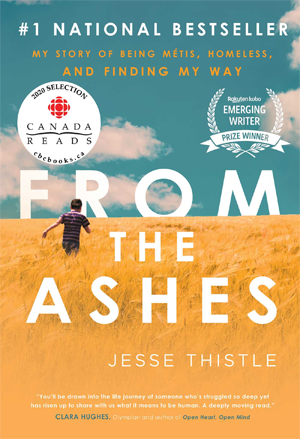From the Ashes

Abandoned by this parents as a toddler, Jesse Thistle briefly found himself in the foster care system with his two brothers, cut off from all they had known. Eventually the children landed in the home of their paternal grandparents, whose tough-love attitudes quickly resulted in conflicts. Throughout it all, the ghost of Jesse’s drug-addicted father haunted the halls of the house and the memories of every family member. Struggling with all that had happened, Jesse succumbed to a self-destructive cycle of drug and alcohol addiction and petty crime, spending more than a decade on and off the streets. Finally, he realized he would die unless he turned his life around.
In this heartwarming and heart-wrenching memoir, Thistle writes honestly and fearlessly about his painful past, the abuse he endured, and how he uncovered the truth about his parents. Through sheer perseverance and education–and new found love–he found his way back into the circle of his Indigenous culture and family.
An eloquent exploration of the impact of prejudice and racism, From the Ashes is, in the end, about how love and support can help us find happiness despite the odds.
Jesse’s story
I originally read this book back in February, but recent events have reminded me of how I felt forever changed at its conclusion. It is undoubtedly one of the most raw, most honest and powerful memoirs I have read to date. Jesse’s story is heart wrenching, heavy, and so, so inspiring.
This extremely well-written memoir gives the highly uncomfortable look into the very real consquences of generational trauma and systemic racism. The personal details of living through the brutal darkness of addiction and homelessness are shocking and disorienting. Jesse is upfront about the existence of holes in his memory due to heavy drug use, which adds an additional layer of appreciation for how much emotional work had to be done before any writing even commenced.
The only true solice I get from this book is knowing that Jesse makes it out of this story alive and well1, and eventually finds love. When I finished the book, though relieved for Jesse’s success in overcoming the consequences of his abuse and his subsequent addictions, I couldn’t shake the feeling of unease. Jesse made it out. Countless others did not. Jesse found his voice to tell his story. Too many others with similar stories will never have such an opportunity.
And most of all, I couldn’t help but think, “what were we really celebrating when Canada had its 150th anniversary of Confederation?”
Why these stories need to be told
While Canada is a diverse, multi-cultural democracy that enjoys a global reputation as a defender of human rights and a strong record on core civil and political rights protections guaranteed by the Canadian Charter of Rights and Freedoms, the country has struggled to address some longstanding human rights challenges, including wide-ranging abuses against Indigenous peoples. Some may be surprised to know that Canada only officially removed its objector status to the United Nations Declaration on the Rights of Indigenous Peoples (UNDRIP) in 20162.
Today, the Canadian Senate unanimously voted to create national holiday for truth and reconciliation. The swift passage of Bill C-5 came shortly after the discovery of what are believed to be the remains of 215 Indigenous children in unmarked graves at a former residential school in Kamloops, B.C. Update: As of July 13, 2021, since May, more than 1,308 suspected graves have been uncovered near the sites of former residential schools: 215 in Kamloops, B.C., 182 in Cranbrook, B.C., 751 in Marieval, Sask., and the more than 160 found on Penelakut Island, B.C.3
The generational trauma of these human rights violations yielded structural and systemic discrimination. In 2018/2019, Indigenous adults accounted for 31% of admissions to provincial/territorial custody and 29% of admissions to federal custody, while representing approximately 4.5% of the Canadian adult population4.
Back in 2019, the conclusion of the Inquiry into missing and murdered Indigenous women made 231 recommendations and concluded that acts of violence against Indigenous women and girls amount to “genocide”5. A statutory holiday is simply not enough.
Footnotes
1SPOILER Jesse Thistle is currently an Assistant Professor in Métis Studies at York University in Toronto, a Governor General’s Academic Medal winner, as well as a Pierre Elliot Trudeau and Vanier Scholar.
2Canada: Events of 2019. Human Rights Watch: World Reports 2019.
3More Than 160 Additional Indigenous Graves Have Been Found In Canada. NPR.
4Malakieh, J. 2020. Adult and youth correctional statistics in Canada, 2018/2019. Statistics Canada.
5Tasker, J. P. 2019. Inquiry into missing and murdered Indigenous women issues final report with sweeping calls for change